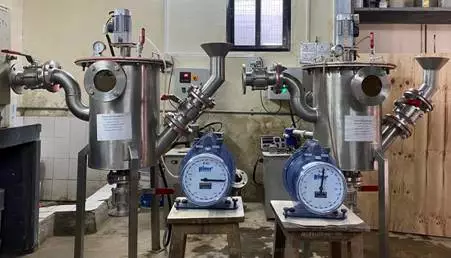

Anaerobic digesters for two-stage biohydrogen and biomethane production.
<p>
In a major breakthrough, Indian scientists have developed a new technology for direct generation of hydrogen from agricultural residues such as paddy, wheat and maize straw. This innovation by Indian researchers has the potential to give a fillip to eco-friendly hydrogen fuel-cell electric vehicles, according to information provided by the ministry of science and technology.</p>
<p>
The technology will also help to solve the problem of disposing of agricultural residue which is a major challenge as crop waste such as paddy straw is burnt in the fields leading to massive pollution.</p>
<p>
<img alt="" src="https://www.indianarrative.com/upload/news/bio-hydrogen_production.jpg" style="width: 100%; height: 100%;" /></p>
<p>
<em>Continuous bio-hydrogen production in reactor</em></p>
<p>
A team of researchers from Agharkar Research Institute (ARI), Pune, an autonomous institute of the Department of Science and Technology, in collaboration with Sentient labs of KPIT Technologies, have developed this technology at lab-scale to extract hydrogen from agricultural residues.</p>
<p>
An Indian Patent application has been filed to protect the IPR.</p>
<p>
<strong>Also read:&nbsp;</strong>&nbsp;<a href="https://www.indianarrative.com/science-news/india-develops-new-technology-to-convert-high-ash-coal-to-gas-for-use-as-green-fuel-115454.html">India develops new technology to convert high ash coal to gas for use as green fuel</a></p>
<p>
The developers of the technology explained that the hydrogen fuel generation process comprises the use of a specially developed microbial consortium that facilitates biodegradation of cellulose- and hemicellulose-rich agricultural residues, such as biomass of paddy, wheat, or maize, without thermo-chemical or enzymatic pre-treatment. The process generates Hydrogen in the first stage and Methane in the second. The methane generated in the process can also be used to generate additional hydrogen, they added.</p>
<p>
&ldquo;This breakthrough of generating hydrogen from unutilized agricultural residue will help us to become self-reliant on energy resources. It will also add a major stream of revenue to the farmer community,&rdquo; said Ravi Pandit, Chairman, Sentient Labs.</p>
<p>
&ldquo;Our technology is 25% more efficient as compared to conventional anaerobic digestion processes used today. The two-stage process eliminates the pre-treatment of biomass, thus making the process economical and environment friendly. This process generates a digestate that is rich in nutrients which can be used as an organic fertilizer,&rdquo; said Dr. Prashant Dhakephalkar, Director of ARI.</p>
<p>
A team of scientists, Dr. S.S. Dagar and Pranav Kshirsagar from MACS-ARI and Sri Kaustubh Pathak from KPIT-Sentient, contributed significantly towards the development of the process.</p>
India has emerged as a country with the third-largest growth in power generation capacity globally…
Prime Minister Narendra Modi hailed Indian chess grandmaster Divya Deshmukh for defeating world number one…
The family of detained Baloch leader Mahrang Baloch has accused prison authorities at Quetta's Hudda…
The QS World University 2026 Rankings bring great news for our education sector, as the…
Speaking at the India Global Forum, Union Minister of Commerce and Industry, Piyush Goyal, says…
Amid the ongoing conflict with Iran, Israel's Foreign Ministry said on Thursday that Soroka Hospital…